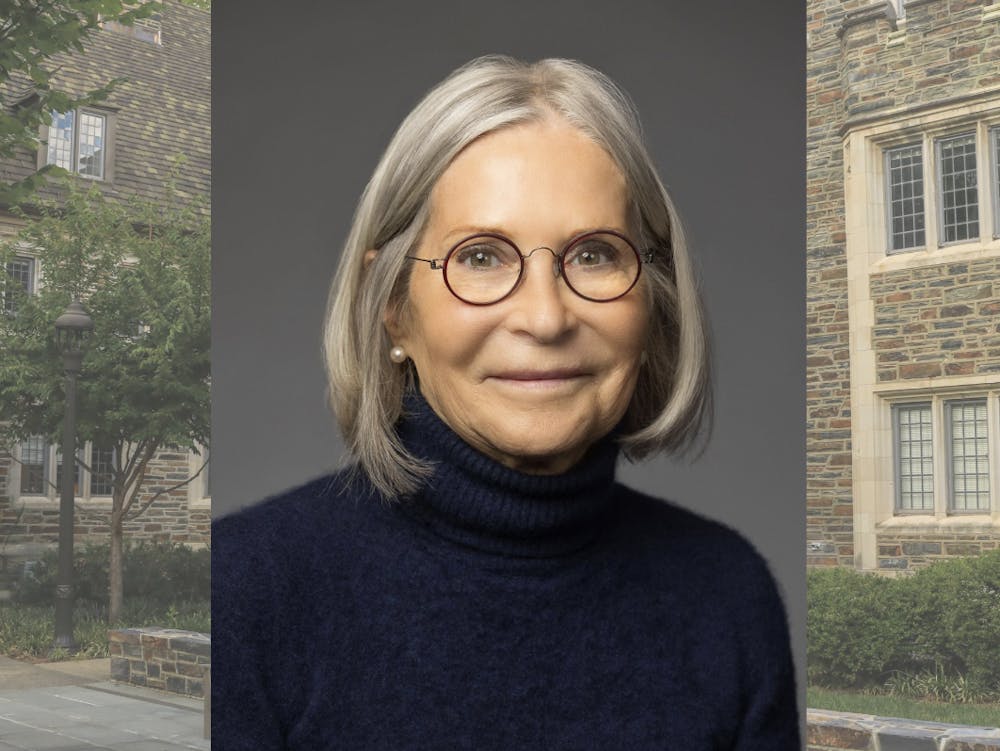Michèle Longino, professor emerita of Romance studies, is remembered for her significant contributions to the field of 17th century French studies, her role in promoting global education and her selfless commitment to the success of her students and colleagues.
Longino, lauded for her work on Orientalism and gender in French literature, died Nov. 21 at Transitions Hospice in Raleigh after a battle with cancer.
“She was a great spokesperson for both past and contemporary French culture,” said Helen Longino, professor emerita of philosophy at Stanford University and Michèle’s sister. “She also had a critical view of it … Some people see culture as something to be preserved in a vitrine, whereas I think she saw culture as something to be engaged with actively and critically.”
Longino, born in Paris, was raised in both the United States and Europe. After graduating from Rosary College — now known as Dominican University — with a bachelor’s degree, she served in the Peace Corps on an assignment in Somalia. She then received her doctorate from the University of Michigan in 1984 and began teaching at Rice University.
She came to Duke in 1989, where she was heavily involved in the University’s department of Romance studies and Center for French and Francophone Studies.
“Michèle was always doing cutting edge [work],” said Martin Eisner, chair of the department of Romance studies and professor of Italian, noting the importance of her impressive body of work in attracting graduate students to Duke.
Longino’s first book, “Performing Motherhood,” was published in 1991 and pioneered a new way of interpreting the letters of 17th century French aristocrat Mme. de Sévigné. Instead of the letters just being read for their literary qualities, Longino argues that they should also be read as the work of a historian.
“Michèle brought a new perspective to understanding those letters both as thinking of them … not just [as] masterpieces of literary form, but as documenting history and also shedding a light on mother-daughter relations,” Helen Longino said. “… That was bringing a neglected area into the spotlight.”
Her second book, “Orientalism in French Classical Drama,” published just over a decade later in 2002, provided a critical reading of the formation of the French identity and relationship with the Ottoman Empire through drama. Her perspective earned her the Modern Language Association’s Scaglione Prize.
Longino’s work made a profound intellectual impact in her field. Throughout her career, she earned the esteemed Chevalier dans l’ordre des Palmes académiques award from the French Ministry of Education and fellowships from National Humanities Center and the Camargo Foundation. Those accolades highlighted Longino’s unique perspective that she contributed to Duke’s academic community.
“It’s crucial for Duke to have scholars who understand history and where we’re all coming from, and Michèle’s work did that,” said Toril Moi, James B. Duke distinguished professor of literature. “… Her work will be sorely missed.”
However, her impact on the Duke community was far broader than her academic accomplishments.
Longino was well revered by her colleagues and former students in her role as a mentor, with Helen Solterer, professor of Romance studies, describing her as a “lifelong ally for her students.”
“Above all, she inspired them to think about their world and their own work with writers in French, [including] de Sévigné, Voltaire [and] Colette,” Solterer wrote in an email to The Chronicle.
Helen Longino shared the same sentiment, noting that several of her sister’s former graduate students reached out to her in her final days.
“At Duke, she was certainly passionate about her students,” she said. “… I know from talking with her that she was very invested in their success.”
Longino directed the Center for French and Francophone Studies from 2002 to 2005. She was chair of the department of Romance studies from 2007 to 2010, where Eisner described her as a “wonderful citizen” who actively mentored and supported junior faculty.
“If you had an event, [it was] likely that she was going to show up and be there,” Eisner said. “You can often spend a lot of time doing an event, and not many people show up … it was a delight to be able to count on her being there.”
During her tenure as chair, Longino was active in bringing French artists, scholars and journalists to Duke to promote an understanding of French culture among students and faculty. According to Solterer, she was also heavily involved in advocating for the inclusion of Haitian Creole in the French department at Duke.
Longino was also a champion for global education in France and Italy.
Get The Chronicle straight to your inbox
Sign up for our weekly newsletter. Cancel at any time.
“She was a truly international, cosmopolitan person,” Moi said. “… She was fluent in French and Italian. She really was a citizen of the world in that way, and she cared about having Duke students go to Paris.”
Longino served as the academic director and president of the EDUCO consortium, an academic and cultural immersion program which included Tulane University, Emory University, Cornell University and Duke in France.
“Paris was very much her home; she was committed to our various programs there, especially EDUCO — over decades,” Solterer wrote. “I have no doubt that many alums who get nostalgic about their study abroad will have Michèle at the heart of their memories, coming to see her for guidance in Montparnasse, and other Duke addresses on the Left Bank.”
Though, beyond her professional accolades, her sister described her as having had a “great sense of fun,” with a passion for social justice and a “wonderful sense of elegance.”
“She was an incredibly brave and courageous person,” Moi similarly noted. “… She kept her elegance, composure and strength of mind as long as I [knew] her.”
Kate Haver is a Trinity sophomore and a university news editor of The Chronicle's 120th volume.

